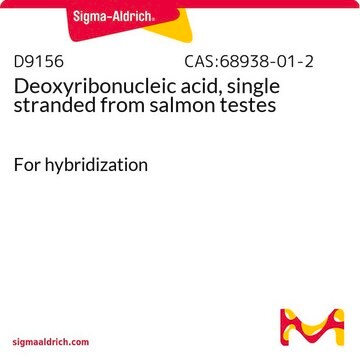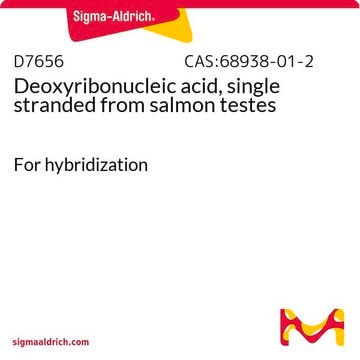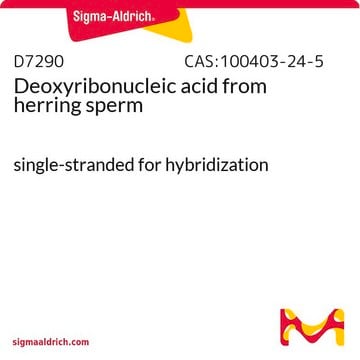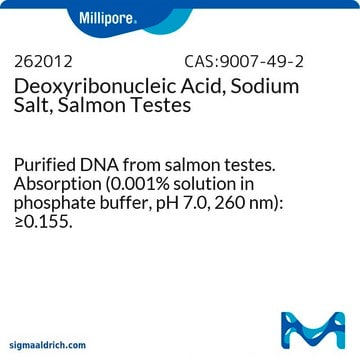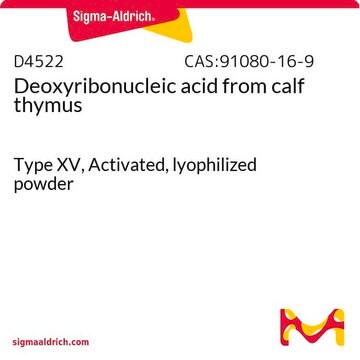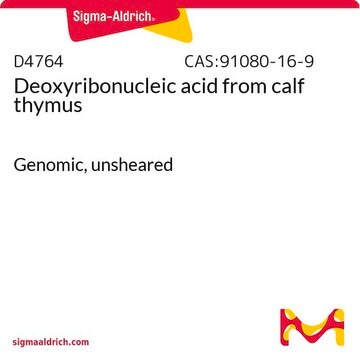D6898
Deoxyribonucleic acid sodium salt from herring testes
Type XIV
Sinónimos:
DNA
Iniciar sesiónpara Ver la Fijación de precios por contrato y de la organización
About This Item
Productos recomendados
¿Está buscando productos similares? Visita Guía de comparación de productos
Categorías relacionadas
General description
Deoxyribonucleic acid sodium salt from herring testes, also known as HtDNA is a natural source of DNA designed for DNA binding agent studies. The detection limits of HtDNA are around 5.0ng and linear ranges of light scattering intensity (I(LS)) is 0.05-2.5 mµg.
Application
Deoxyribonucleic acid sodium salt from herring testes is used in studies of DNA binding agents that modulate DNA structure and function. Herring testes DNA is also used in physicochemical studies of DNA behavior in solution.
Storage Class
13 - Non Combustible Solids
wgk_germany
WGK 3
flash_point_f
Not applicable
flash_point_c
Not applicable
ppe
Eyeshields, Gloves, type N95 (US)
Certificados de análisis (COA)
Busque Certificados de análisis (COA) introduciendo el número de lote del producto. Los números de lote se encuentran en la etiqueta del producto después de las palabras «Lot» o «Batch»
¿Ya tiene este producto?
Encuentre la documentación para los productos que ha comprado recientemente en la Biblioteca de documentos.
Los clientes también vieron
X Du et al.
Talanta, 55(1), 93-98 (2008-10-31)
The interaction of histone with nucleic acids was characterized by light-scattering measurement using a common spectrofluorometer. Thereby, a sensitive and convenient method for the determination of nucleic acids was established. At pH 4.5-6.5, the interaction of histone with nucleic acids
Assaf Marcus et al.
Immunity, 49(4), 754-763 (2018-10-18)
Detection of cytosolic DNA by the enzyme cGAS triggers the production of cGAMP, a second messenger that binds and activates the adaptor protein STING, which leads to interferon (IFN) production. Here, we found that in vivo natural killer (NK) cell killing
Renée M Van der Sluis et al.
PLoS pathogens, 16(2), e1008151-e1008151 (2020-02-29)
HIV latency is the major barrier to a cure for people living with HIV (PLWH) on antiretroviral therapy (ART) because the virus persists in long-lived non-proliferating and proliferating latently infected CD4+ T cells. Latently infected CD4+ T cells do not
Larisa I Labzin et al.
The EMBO journal, 38(21), e101365-e101365 (2019-08-31)
Inflammasomes are potent innate immune signalling complexes that couple cytokine release with pro-inflammatory cell death. However, pathogens have evolved strategies to evade this cell autonomous system. Here, we show how antibodies combine with innate sensors in primary human macrophages to
K L Jønsson et al.
Nature communications, 8, 14391-14391 (2017-02-12)
Innate immune activation by macrophages is an essential part of host defence against infection. Cytosolic recognition of microbial DNA in macrophages leads to induction of interferons and cytokines through activation of cyclic GMP-AMP synthase (cGAS) and stimulator of interferon genes
Nuestro equipo de científicos tiene experiencia en todas las áreas de investigación: Ciencias de la vida, Ciencia de los materiales, Síntesis química, Cromatografía, Analítica y muchas otras.
Póngase en contacto con el Servicio técnico

